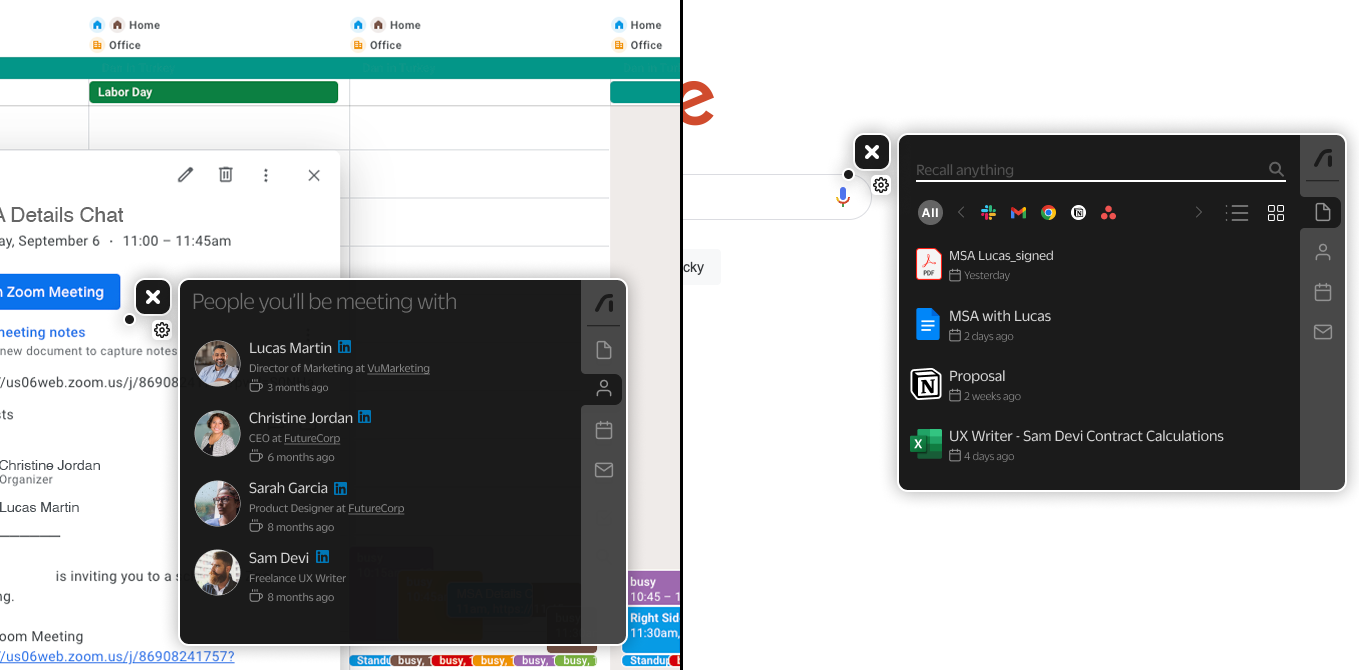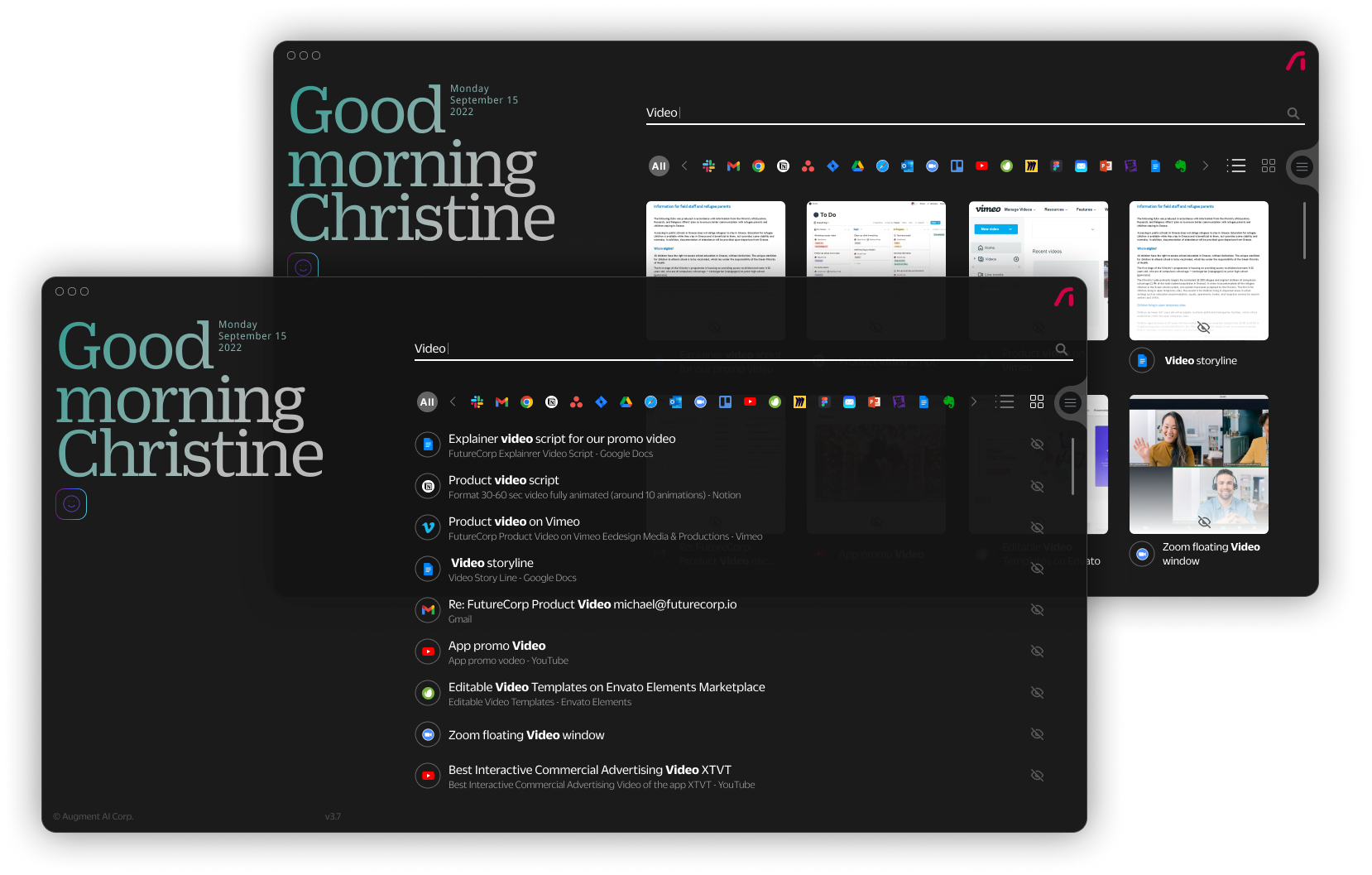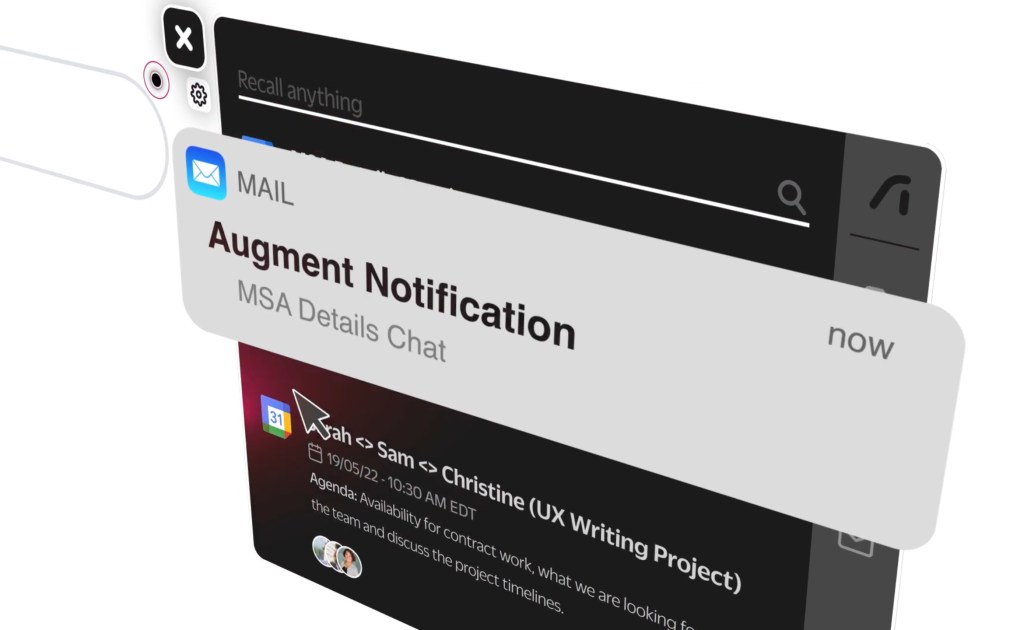If you’re having trouble tracking your work and personal life as it spreads over 20 different apps and productivity suites, to the point where you have a meeting in five minutes you don’t even remember making, you’re not alone. We can’t all have a PA to keep track for us, but Augment hopes that a PAI, if you will, might be the next best thing, learning from every digital interaction you have and providing the info you need before you even ask for it.
“Hold on,” I hear you typing. “Didn’t you write this story five years ago, about Atlas Informatics?” Why yes, I did — what a memory you’ve got. But Atlas sank without a trace, while founder (and Napster co-founder) Jordan Ritter dropped off my radar after it until a couple weeks ago, when Augment reached out to talk about what amounts to the next generation of the idea, with a decidedly more modern approach. He co-founded the company with Dan Cintra and Saurav Pahadia, the heads of product and engineering, respectively.
The basic idea of Atlas was that “everything seen is remembered,” making your whole online world locally searchable, from appointments and contacts to tab groups and purchases. But tying it to search seems to have been a misstep, Ritter explained to me, for various reasons, but perhaps just because searching for something assumes you know what you’re looking for. The new problem is our data is spread so widely that you might not even remember that there’s something to remember.
“Instead of search, what we’re building is a learning AI. At its foundation, it learns what is important to you to help you be more productive,” Ritter said. The system will use modules catering to various needs, the first of which “is for people with a meeting-jammed life. We don’t remember everything; we can’t find all the communications or documents in the moment; in the meeting we’re engaging and at the end we don’t have time to do the follow-ups, because it’s time for the next meeting. Augment does that for you, all alongside the apps you know and love.”
If you’ve ever worked with a talented EA or PA, you know how invaluable it is to have information like this at your fingertips — and it’s largely a matter of good organization, not deep familiarity with the people or concepts involved. Not everyone has those skills, and it’s gotten harder as the tools we use have multiplied and siloed themselves.
“We used to think of the app ecosystem as the solution,” Ritter said. “Now we have tons of point solutions and pages of apps.”
One solution is to do everything on one service, or a couple that integrate very closely together. Nice if you don’t mind being utterly at the mercy of Google, Microsoft, Apple or Salesforce. “Or you can use us as a bridge across services, and use whatever calendar you want,” he continued.

Augment’s CTO Dan Cintra, with a resumé including Google and Axon, described what the product is meant to do for a person who finds themselves frequently unprepared or totally unaware of what’s happening next. (As you may be able to tell, I am one of these people. In fact I was late to the meeting with Augment for no good reason.) “What we’re solving for is context,” Cintra said.
He showed an example of what showed up for their meeting with me: contact info, recent threads in email or other apps, info pulled in from whatever databases have me in it (it would normally be LinkedIn and so on), as well as soft info like the topics I normally cover, some personal details and so on. It included documents that had been sent between us in relevant conversations, and if we had had previous meetings, it would have links to those recordings and summaries. After the meeting, you get action items tagged to people, a transcript and summary, and other follow-ups.
This was all displayed via a native app that pops up before and after meetings, but browsers can be “augmented” as well, with a browser overlay that has the AI popping up with info where it’s appropriate — on a calendar entry, a meeting invite or next to a name in an email thread.
Here’s a video of Augment’s first Augments in action:
None of this is pulled in through APIs with Gmail, Zoom or anything else. It’s all collected and organized by Augment’s agent and collated on their own systems.
“Because of where we sit on the stack, we’re streaming the data as it comes,” said Cintra. And where is that, exactly? In a very privileged position, obviously, since the agent will have access to your browser, sound in and out, etc. That’s necessary for it to operate, but it isn’t just doing screen scraping or something hacked together.

“Its main approach is through accessibility and assistive devices — you can think of it as an automatic Evernote,” Ritter suggested. I replied that anyone who works in IT or security probably couldn’t hear him over the alarm bells going off in their heads. It is after all a single point of failure that aggregates data from every service you use.
Ritter acknowledged that there might be some skepticism, but that they were careful to build for security and privacy from the start, getting a SOC 2 certification and making sure users own their data from top to bottom. It may be a while before enterprises are OK with this level of meta-organization, but he pointed out they also took years to warm up to Dropbox, iPhones and other now-indispensable tech. For now they’re targeting individual prosumers, perhaps freelancers juggling multiple clients.
Augment is coming out of stealth today after having raised a $3.5 million seed round led by Flying Fish and JAZZ Venture Partners, with participation from Incisive Ventures and the Allen Institute for AI’s Incubator (which I have covered before itself).






























Comment